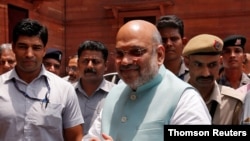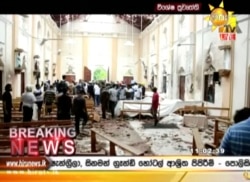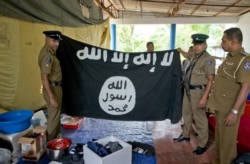Indian authorities are stepping up efforts to investigate and bring charges against Indian citizens allegedly linked to Islamic State (IS). This comes in the wake of the Easter bombings in April in neighboring Sri Lanka that killed 259 people and wounded hundreds, according to Indian officials.
To achieve this, the Indian parliament amended laws giving the National Investigation Agency (NIA) expanded powers to prosecute individuals designated as “terrorists.”
Last week, India passed the NIA amendment bill in the parliament’s Upper House, after resistance from opposition political parties in both houses of parliament.
India Home Minister Amit Shah, from the ruling Bharatiya Janata Party, said that passing the bill, “Unlawful Activities (Prevention) Amendment Bill (UAPA),” had become necessary to keep law enforcement agencies “four steps ahead of terrorists.”
“It is important to designate individuals as terrorists as they start new organizations once an outfit is banned,” Shah told the country’s lawmakers, while making a case for the new law.
Experts see the new amendment as paving the way for authorities to prosecute Indian citizens, arrested for links with the Sri Lankan bombers and other terrorism related charges.
Since the Sri Lanka bombings, Indian authorities have stepped up their efforts to crack down on suspected militants. There are fears of copycat effects by IS sympathizers in parts of India.
Several arrests
In April, the NIA raided districts of Kerala state, where, among others, they arrested Riyas Abu Bakr and Abu Dujana for alleged links with Hashim. Abu Bakr reportedly traveled to Afghanistan in 2016 to meet IS militants and plan an attack in India.
The arrests followed the seizure of computers and confiscated handwritten notes from several suspects that could link them with Sri Lankan bombing mastermind, Zahran Hashim, a member of National Towheed Jamaat. Authorities discovered Azarudeen was a Facebook friend Hashim.
The Islamic State (IS) claimed responsibility for the Sri Lankan terrorist attacks, showing a video that featured Hashim pledging allegiance to the terror group. NIA investigations reveal that Hashim spent a few months in India, where he tried to motivate youths there to join IS.
Chief editor of New Dehli Opinion Post, Maneesh Kumar, has followed the arrest of Indians since the bombings in Sri Lanka. He told VOA that the stage is now set to prosecute the suspected Indians for being linked to the Easter bombing.
“NIA has won the government’s support to file cases against Indians in Tamil Nadu and Kerala connected to the Sri Lanka terror attacks,” Kumar said.
Raids in Kerala
In April, the NIA raided districts of Kerala state, where, among others, they arrested Riyas Abu Bakr and Abu Dujana for alleged links with Hashim. Abu Bakr reportedly traveled to Afghanistan in 2016 to meet IS militants and plan an attack in India.
“There is a very strong network between Indians from the south Kerala and Tamil Nadu, and Islamic extremists in Sri Lanka,” Uday Bhaskar, a retired Indian naval officer and a military expert, told VOA.
In June, the NIA raided locations in Coimbatore, Tamil Nadu, and arrested seven men on charges of propagating IS ideology and recruiting youths for attacks in India.
Some security analysts charge that certain Indian nationals have previously traveled to Syria, Iraq, Kashmir and Afghanistan to fight for the IS terror group, with some returning to India to build networks in the region.
‘Wake up call’
Zubair Iqbal, an analyst at the Washington-based Middle East Institute, charges that connections between radicals in India and Sri Lanka should server as a “wake up call” for India.
“Militant operatives in South India spent a year scoping the seaside town of Kattankudy in Sri Lanka [before carrying out the attack],” Iqbal told VOA, adding that the militants were able to penetrate the strong ethnic bonds among Tamils.
“The militants went beyond Tamil ethnic relationships to bond with Sri Lankans on the basis of religion,” he said.
Despite limited resources, experts believe IS has been able to forge a network of dedicated followers in India’s south. They say this is in part because IS has been desperately searching for new fertile grounds and opportunities to conduct or inspire major terror attacks.
“IS selected Kerala because it had built a relationship with [some] Indians in the south,” Kamran Bukhari, founding director of the Center for Global Policy in Washington, told VOA.
“IS has become so dependent on people on the ground, that it goes to where there is an availability of human resources,” Bukhari added.
Political division
Opposition parties have expressed concern that minorities may suffer under the new law.
Last week Indian Home Minister Shah urged opponents to support the UAPA law, “to prove to the world and the terrorists that we are united in this fight.”
Congress Party spokesperson Meem Afzal told VOA, “There is a lot of difference between what the home minister is saying, and our concern about a law being misused against minorities.
“We are preparing a full-fledged rebuttal to the BJP’s passage of the NIA amendment bill,” he said, adding that his party would challenge the new law in the country’s Supreme Court.
The new law mandates that individuals declared “terrorists” could face a travel ban and their property could be seized. Moreover, NIA would investigate offenses perpetrated outside the country, which according to some analysts, could amount to abuse of power.
The ruling BJP has assured the opposition that a four-level scrutiny system would ensure the NIA amendment does not violate human rights.
Still, some security analysts like Bhaskar argue, “Some aspects of the bill like confiscating property of suspected terrorists may be excessive.”
Concerns of radicalization
Some experts are concerned that the government’s push to pass the new terror law could lead to the radicalization of India’s Muslim population.
“If the BJP grows more powerful, it’ll shift the power balance and the cultural milieu. If there is excessive persecution of Muslims, this could push Indians toward IS,” analyst Iqbal said.
Other Indian analysts say that India is fundamentally secular and will not deviate from its constitutional order.
“India is determined to see that there is no fundamentalism and all hues of Islamic faith flourish,” Lt Gen. (retired) Kamal Dawar, former director general of India’s Defense Intelligence Agency (DIA), told VOA.






